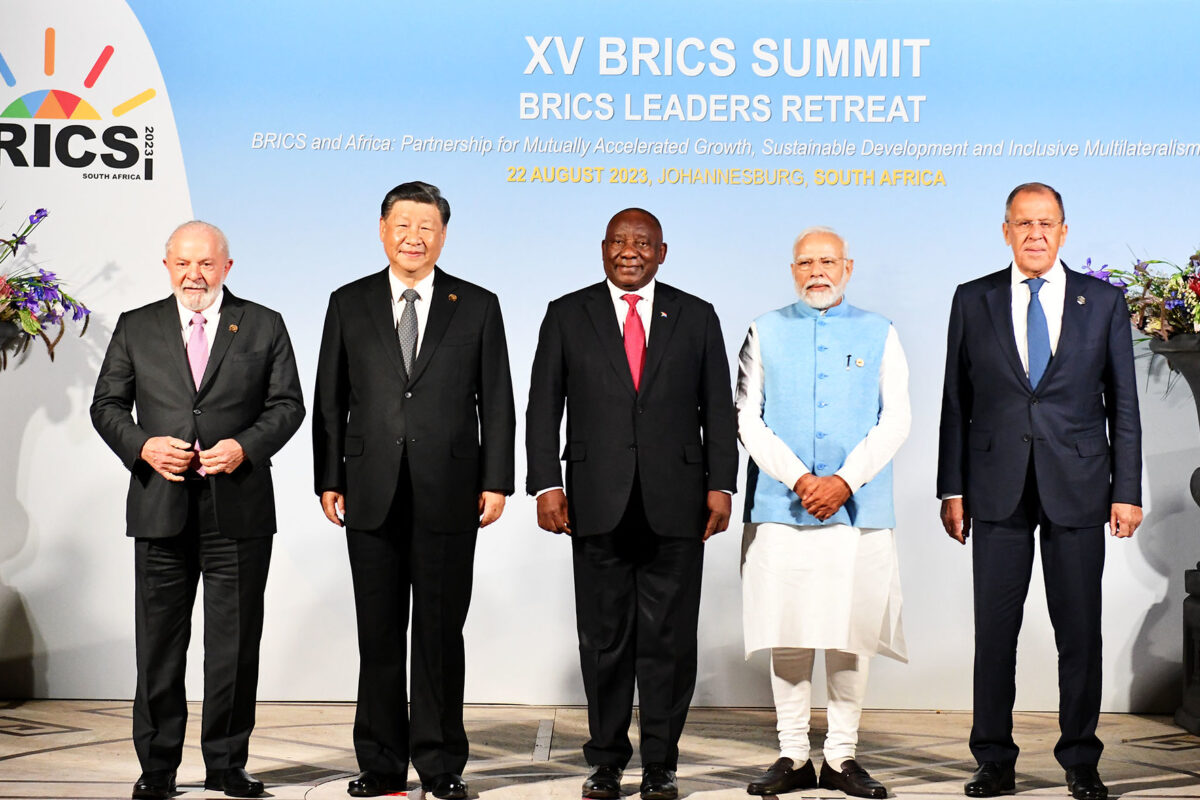South Africa Diplomatic Heft Lacking
Johannesburg BRICS Summit
A champion of moderation – and its own interests – India seems determined to thwart plans by Russia and China to transform the BRICS group of emerging economies into a non-aligned movement 2.0 (albeit one with a pronounced pro-Beijing tilt) as the five countries meet for their annual summit.
This edition of the get-together is taking place in Johannesburg, South Africa. More than twenty countries have formally asked to join the economic forum with, again, Russia and China supporting the group’s expansion whilst India and Brazil are for now happy to keep BRICS as-is.
India’s foreign secretary Vinay Kwatra said that his country keeps an open mind to the admittance of new members but added that a consensus on the criteria is needed first. Meanwhile, South Africa, the first and only add-on to the original group of four, tries to plot a course between its desire to cosy up to Russia and China on the one hand, and the necessity not to stray too far from the United States and Europe on the other. Under president Cyril Ramaphosa and his predecessors, the country has slowly drifted away from the West under the guise of multilateralism.
In a televised address to the nation, President Ramaphosa said that South Africa will not be drawn into a ‘contest between global powers’ and advocated for a ‘more balanced’ global order. For South Africa, this implies a deeper insertion into the Global South – a loosely defined collection of emerging economies in Africa, Asia, and Latin America – where it may enjoy some of the diplomatic and economic heft that it lacks on the world stage.
The trouble for BRICS is that it currently lacks a clear purpose or mission statement and has, in its fourteen-year-history, not really outgrown the chat group stage. Attempts to create a reserve currency that lessens members’ dependency on US dollar have been discussed since BRICS celebrated its 2009 inaugural meeting in Yekaterinburg, Russia, without discernible results.
No-Strings Cash
Though a development bank has been set up in 2015 as a counterweight to the much-maligned International Monetary Fund (IMF) and the World Bank, it so far largely failed to live up to the promise of extending loans in local currency (aside from renminbi). The Shanghai-based New Development Bank (NDB) is chaired by Dilma Rousseff, a former president of Brazil who resigned in 2016 after she had been impeached on dubious and politically inspired charges.
The NDB has deftly managed to limit the fallout of the bank’s exposure to Russia which holds 19.4% of its capital. Though the bank’s credit rating was downgraded by one notch to AA, it managed to retain access to US capital markets where it successfully placed a $1.25 billion green bond in May. Sadly, for Ms Rousseff, American investors don’t ‘do’ rand, rupee, rouble, or real.
According to Ms Rousseff, the bank has been forced to suspend all operations in Russia to avoid sanctions: “We cannot not deny that the international financial system exists and just have to live with that.” The NDB-chairwoman said that the bank’s credit portfolio amounts to $33 billion and emphasised that the institution does not attach political or ethical conditions to its loans as the IMF and World Bank do: “We repudiate any kind of conditionality and respect the policies of each country.”
Whilst that may sound like a disaster waiting to happen, the NDB is part of a much broader palette of interlocking policies, institutions, and initiatives that seek to affirm China’s position as a first amongst equals in the developing world.
On the eve of the summit, President Xi Jinping of China conferred with his South African host to press the case for BRICS expansion. Though officially receptive to China’s push, South Africa fears that its already limited clout may suffer with the accession of new member states. That concern is shared by both Brazil and India who suspect China of plotting against their attempts to secure a permanent seat on the United Nations Security Council.
Criteria, Please
Due to these and other internal disagreements, it is expected that the Johannesburg summit will only try to define BRICS membership criteria whilst leaving the admittance of new members for another occasion. This is sure to disappoint the leaders of candidate countries who were invited to join the group in South Africa but remain excluded from participation.
Russian president Vladimir Putin did not travel to Johannesburg sparing the host nation the embarrassment of having to comply with an arrest order issued by the International Criminal Court in The Hague or risk falling foul of its treaty obligations as a party to the court. In March this year, President Putin was indicted in The Hague for the abduction of Ukrainian children – a war crime.
His absence is a relief to some participating heads of state who, like President Ramaphosa, are reluctant to join the West in its condemnation of Moscow but also would not necessarily want to be seen shaking hands with the Russian president.
The apparent lack of purpose that characterises the five BRICS states is rooted in sharp economic divergence. Whilst China and India have registered sustained accelerated GDP growth since the inception of the group in 2009 (+138% and +85% respectively), Russia (+13%) and Brazil (+4%) have been laggards. Over that period South Africa saw its GDP shed five per cent. China now represents 72% of the BRICS combined GDP, perhaps justifying the country’s insistence on getting its way.
However, looked at from a different angle, BRICS is a club of two of the world’s biggest commodity importers and three commodity exporters. A sceptical observer could conclude: moving on, nothing much to see. That onlooker would probably be right, but possibly not for very long.
Cover photo: BRICS leaders gather in Johannesburg.
© 2023 Photo by GovernmentZA


